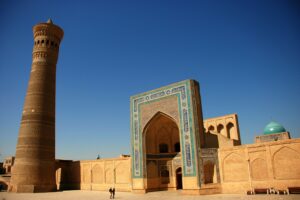
Rayimbek Matraimov arrested upon return to Kyrgyzstan
In a significant development, Rayimbek Matraimov, a former customs official in Kyrgyzstan known for his influential political connections, has been deported from Azerbaijan and arrested upon his return to Kyrgyzstan. This event marks a dramatic shift in the fortunes of a man once considered a kingmaker within Kyrgyz politics.
Matraimov, who has faced numerous allegations of corruption, was apprehended in Azerbaijan and subsequently flown back to his home country, where he was taken into custody by the State Committee for National Security (GKNB). The images of his arrest, showing him being escorted off the plane in handcuffs by masked agents, have circulated widely in the media, symbolizing a fall from grace for the once-powerful figure.
The former deputy head of the Kyrgyz Customs Service, Matraimov has been a controversial figure, implicated in large-scale smuggling operations and money laundering. His return to Kyrgyzstan is part of a broader crackdown on organized crime and corruption by President Sadyr Japarov’s administration. The government has expressed its commitment to combating these issues, which are seen as significant obstacles to the country’s development and stability.
Matraimov’s deportation followed the arrest of five Azerbaijani citizens linked to an alleged assassination plot against Kyrgyz officials. The GKNB stated that the motive behind the conspiracy was to disrupt the Kyrgyz government’s efforts against organized crime groups that have a considerable influence in the post-Soviet region.
The Kyrgyz authorities have not yet confirmed Matraimov’s detention on home soil, but reports from RFE/RL’s Kyrgyz Service and other media outlets, citing government sources, suggest that he is indeed in custody. The details of the alleged assassination plot and Matraimov’s involvement are still emerging, with the investigation ongoing.
This case has drawn international attention, highlighting the challenges faced by post-Soviet states in addressing corruption and the influence of powerful individuals within their political systems. Matraimov’s arrest is seen as a test case for Kyrgyzstan’s resolve to uphold the rule of law and tackle deeply entrenched corrupt practices.
As the situation unfolds, the eyes of the world will be on Kyrgyzstan to see whether this marks a turning point in the country’s fight against corruption or if it is merely a temporary setback for those involved in such activities. The outcome of this case could have far-reaching implications for the region’s political landscape and the future of governance in Kyrgyzstan.

